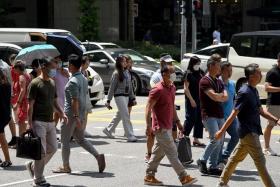Employers concerned about maids’ lack of financial knowledge
They say new rule that bars them from safekeeping maids' salaries may cause maids to turn to moneylenders
Employers are concerned that a new rule barring them from safekeeping their maid's money may result in domestic workers getting into financial strife.
The new rule takes effect from Jan 1, the Ministry of Manpower said on Sunday.
Employers found guilty of safekeeping a maid's cash, including her salary, can face a maximum penalty of a $10,000 fine and 12 months' jail.
The MOM said the rule will protect maids and employers from money-related disputes.
A Straits Times straw poll of 25 employers found that 14 did not safekeep money. Most of those who did said the arrangement was initiated by the maid or was a mutual agreement.
A housewife who wanted to be known only as Mrs K. Ong, 44, told ST yesterday: "I'm not against this new rule, but the current arrangement is at my helper's request. My maid trusts me and I trust her, so that is what makes the arrangement work."
Maids such as Indonesian Ismonah Sunareri, 49, said she prefers her employer to safekeep her salary as it prevents her from overspending.
Some employers raised concerns that if they did not safekeep salaries, some maids might turn to licensed moneylenders or loan sharks if they spend all their funds.
They also warned that some maids would not save their money and return home empty-handed.
But employers also acknowledged that the new rule does have its upsides.
Mrs Ong said: "It's less of a hassle if I don't safekeep her salary. I won't have to keep taking the money out when she asks for it."
Maid agencies advocate that maids manage their own funds.
Island Maids director Gabriel Ee said his agency advises employers to get a bank account for their maids and pay their salaries electronically.
"Safekeeping salaries used to be prevalent in the past, but younger employers are usually receptive to opening a bank account for their maids," he added.
The new rule is good news for Humanitarian Organisation for Migration Economics.
Its manager of advocacy and communication Stephanie Chok said maids will now have direct access to their money and salaries.
However, she said safeguards should be in place to protect maids who report employers who continue to keep their salaries.
"They should be assured they will not be punished or lose their jobs if they raise the issue," she added.
She also addressed employer concerns that maids lacked the financial literacy to spend or save their money wisely.
"If you think your domestic worker will benefit from a financial literacy course, then you should support her in doing so."
Get The New Paper on your phone with the free TNP app. Download from the Apple App Store or Google Play Store now


